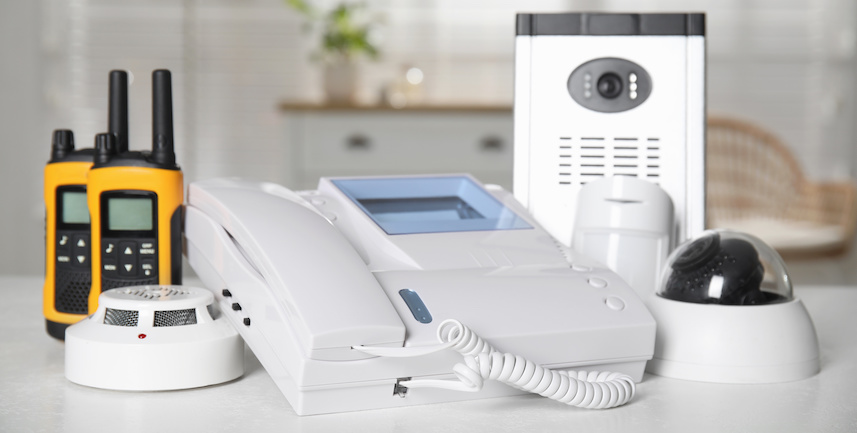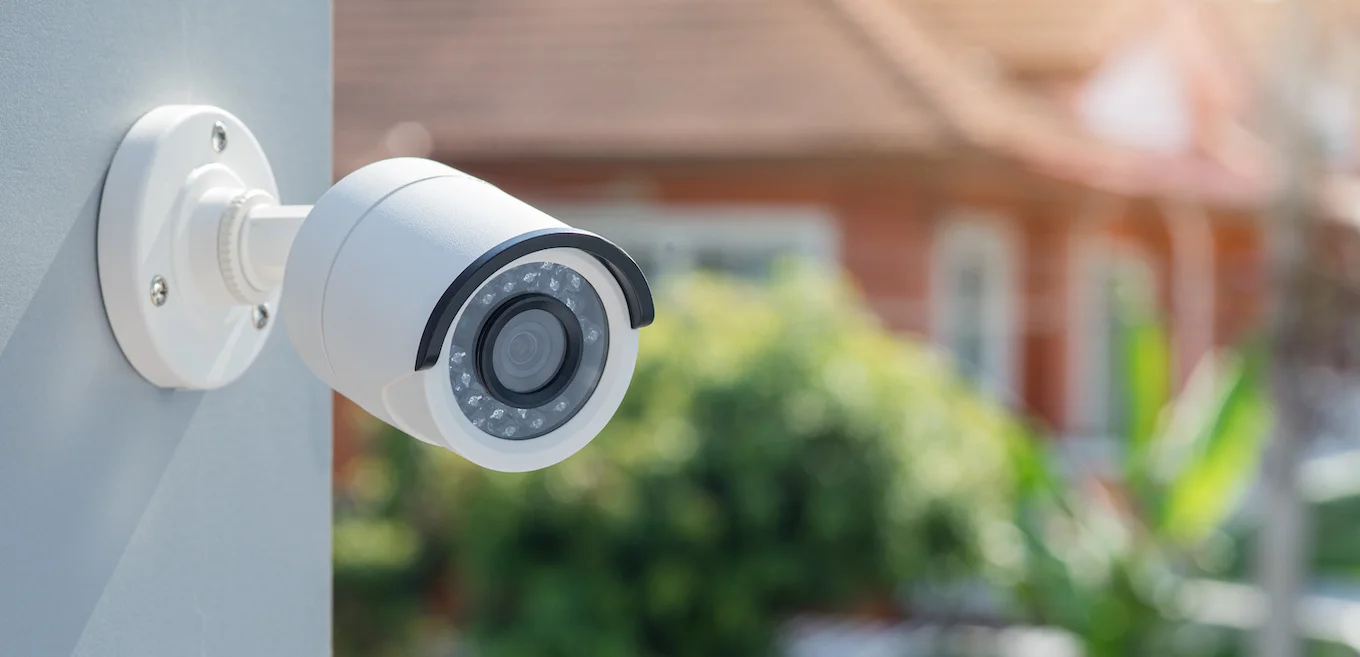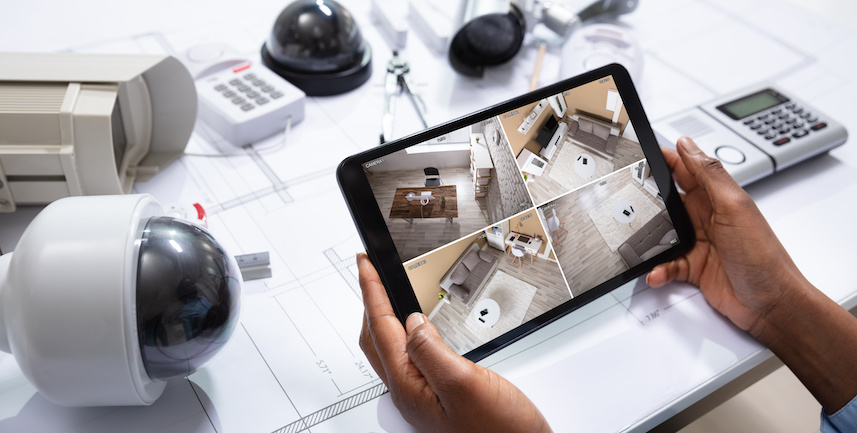There are a few different types of home security systems you might consider, including monitored security systems, wired security systems, wireless security systems, surveillance systems, and unmonitored security systems.
So how do you choose? After almost a decade in the security industry, I’ve worked closely with all types of home security systems and know the pros and cons of each.
In this guide, I’ll describe each of the types of home security systems, their pros and cons, and how to choose the type of home security system that is best suited to your property and needs.
Quick Summary
- A security system is an effective way to deter criminal activity, protect your family and assets, and provide peace of mind
- There are various types of home security systems, each with their own unique pros and cons
- The main types of home security systems include unmonitored, monitored, wireless, and wired
- Environmental sensors, smoke alarms, and carbon monoxide detectors are also important parts of a comprehensive security system
- For the ultimate peace of mind and asset protection, combine an alarm system with security cameras
- Choosing between the different types of home security systems depends on your locations, property layout, home size, budget, and goals
- A consultation with a security professional is the best way to pinpoint the security system that will be ideal for your needs
What Are the Different Types of Home Security Systems?
The main types of security systems I’ll cover in this guide include:
- Monitored security systems
- Unmonitored security systems
- Wired security systems
- Wireless security systems
- Smoke alarms and carbon monoxide detectors
- Environmental sensors
- Video surveillance/security cameras
1. Video Surveillance
Some homeowners choose to only install video surveillance instead of an alarm system. A security camera system allows homeowners to monitor the activity around their home through cameras that detect movement or potential intruders. The footage can be saved to your device so you can access it as needed.
I often see homeowners opt for security camera installation in low crime areas or in cases where they are working on a tight budget but still want a measure of security.
At Delta Prime, we specialise in residential CCTV Perth camera installations and offer several types of security cameras. Although video surveillance does offer benefits, I recommend combining it with an alarm system for a double-layer of protection.
Types of Security Cameras
- Bullet cameras
- Dome cameras
- IP cameras
- Indoor & outdoor cameras
- Wired, Wireless, and Wire-Free
- Smart, voice integrated cameras
Pros of Security Cameras
There are several benefits to installing a video surveillance system, including:
- Affordable security measure
- Can deter crime and theft
- Captures footage if a crime occurs, giving you evidence to provide to police
- Easily monitor your home and check on your property remotely
- Peace of mind
- Visual help when assessing property damage
- Visual proof for insurance claims
- Potential for decreased insurance cost
- Easily identify guests at your door
- Enable additional monitoring and security capabilities
Cons of a Home Video Camera System
- There are recording laws in Australia to be aware of (you can learn more in my blog covering the security camera laws in Australia)
- Does not offer the same level of protecting as video surveillance combined with an alarm system
Who I Recommend Video Surveillance For
- Homeowners who are not are working with a tight budget yet still want an effective security solution
- Homeowners who want to be able to remotely monitor the activity on their property
2. Monitored Security Systems
What Is a Monitored Security System?
A monitored security system can detect threats or unwanted activity and send an alert directly to your security provider. The security provider will then decide the best way to respond to the threat.
For instance, a provider responding to a potential break-in will notify the appropriate authorities. If a fire is detected, the provider will contact the fire department immediately.
As a personal fan of monitored security systems, I like the comfort of knowing a professional monitoring company will know the best way to respond in any scenario.
Pros of a Monitored Home Security System
- Provides the highest level of peace of mind through 24/7 professional monitoring
- Provides an immediate professional response and notifies emergency services if the alarm is triggered
- Highly reliable
- Easy to customise
- If you are unreachable or not able to get home, you can opt to have someone check on your property
- Can still function in a power outage and has a backup battery (although I still recommend having an uninterrupted power supply installed to your router)
- Can also be used to easily alert local authorities in the event of a medical emergency — just get to the keypad rather than having to search out your phone
- Can give you remote access from your mobile device, allowing you to lock or unlock doors, adjust your home’s lighting, monitor the temperature in your home, or check on your family
Cons of a Monitored Security System
- Typically requires a monthly fee for professional monitoring services
- Not ideal if you are on a tight budget
- Requires professional installation (higher cost)
Who I Recommend a Monitored Security System For
- Homeowners who travel frequently are who are away from home a lot
- Homeowners with a high amount of valuable assets that require enhanced protection
- Areas with a high crime risk
- Busy homeowners who do not have the time to check in on the security system
- Homeowners who prefer the peace of mind of having a professional security team overseeing your property 24/7
- Homeowners that want the reassurance of knowing the appropriate personnel will be immediately notified if the alarm is triggered
- Homeowners who want the highest level of security protection
3. Unmonitored Security Systems
What Is an Unmonitored Security System?
Unmonitored security systems typically include security cameras and alarms that help ward off intruders and alert you if there is a possible security threat.
Unlike a monitored system, if a threat is detected, it does not automatically alert authorities. Instead, you’ll receive an alert on your smart phone. As the homeowner, you’ll be responsible for determining how to respond and doing so in a timely manner.
I prefer the convenience and peace of mind of a monitored security system and find it is worth the monthly fee. However, I completely understand that some customers want to avoid the monthly fee and are comfortable with the hands-on approach that an unmonitored security system requires.
Pros of Unmonitored Security Systems
- No monthly fees
- Direct control over how to respond to alerts
- Cost-effective choice for smaller properties or areas with lower crime rates
- Provides real-time footage/notifications if an alarm sensor is triggered
- Can be set up to be controlled remotely from your smart phone
Cons of Unmonitored Security Systems
- Entirely reliant on the user
- May result in delayed response times if a homeowner fails to notify the appropriate emergency services or doesn’t respond quickly enough
- Areas with poor mobile service may cause a delayed response
- Will not function during a Wi-Fi or power outage
- Considered Subpar compared to the protection offered by monitored alarm systems
Who I Recommend an Unmonitored Security System For
- Areas with low crime rates
- Homeowners on a tight budget that still want an affordable home security system
- Homeowners who are comfortable responding to security threats on their own and prefer a hands-on approach to security
- Homeowners who want the option of controlling their security system remotely
4. Wired Home Security Systems
What Is a Wired Security System?
Wired security systems transmit signals through low-voltage cables and wires that are physically connected to homes. Any keypads, motion detectors, and cameras are physically connected to a central control panel.
Pros of Wired Security Systems
- Highly reliable, stable connection
- Physical wiring eliminates interference
- Permanent installation suitable for long-term usage
- Can cover a large range
- Low maintenance
- No need to worry about batteries running low
- Longer lifespan and high durability
- Higher resolution
- Better connection
- Enables remote viewing over mobile devices
Cons of Wired Security Systems
- Intricate installation process
- Higher cost of installation
- Susceptible to power outages
- Involves physical damage due to the need to drill holes into walls and ceilings during the installation process (not recommended for rental properties or historic buildings)
Who I Recommend a Wired Security System For
- Homeowners who need high reliability
- Homeowners seeking a low maintenance security system
- Larger homes or properties with multiple buildings
- Homeowners who opt for a self-monitored security system
- New construction
- Homeowners who plan to stay at their property long-term
5. Wireless Home Security Systems
What Is a Wireless Security System?
Wireless security systems operate by transmitting signals on radio frequencies rather than through physical wires.
Any components of the wireless security system — sensors, cameras, alarms — are connected to a panel through radio signals.
Pros of Wireless Security System
- Remote access capabilities
- Faster, easier installation
- Cheaper than a wired security system
- Not susceptible to power outages
- Can be easily removed and brought with you if you decide to move
- No damage to the building
Cons of Wireless Security Systems
- Outside radio frequencies can cause interference
- Not as reliable as wired security systems
- Requires a dependable Wi-Fi connection
- Limited range (best suited to small to medium size residences)
- Requires a higher level of maintenance due to batteries needing to be monitored and changed
- All sensors and control panels must be within range of each other to effectively transmit signals
Who I Recommend a Wireless Security System For
- Renters who do not want to damage their rental unit
- Renters or homeowners who want to take their security system with them when they move
- Homeowners seeking a cost-effective security solution
- Historic buildings
- Smaller to medium-sized properties
6. Carbon Monoxide Detectors and Smoke Alarms
In my 10 years in the security industry, one of the most commonly ignored types of security systems is also one of the most important: smoke alarms and carbon monoxide detectors.
While these aren’t usually the first things that come to mind when thinking of the different types of home security systems, they play a crucial role in keeping your home and your family safe.
Who I Recommend Smoke Alarms and Carbon Monoxide Detectors For
- Everyone — all homes, apartments, rentals, etc.
7. Environmental Sensors
Smoke alarms and carbon monoxide detectors provide crucial protection for the inside of your home. But what about the exterior?
Environmental sensors can be an important way to protect your home against fire, weather damage, extreme temperature fluctuations, and flooding.
Who I Recommend Environmental Sensors For
- Homeowners who live in areas with high fire risks
- Properties located near a flood plain
- Homeowners who want the highest level of peace of mind
8. Duress Alarms
Duress alarms are specialised security devices designed for instant communication with emergency services or caregivers in dangerous or urgent situations. They are a cornerstone of personal security, providing a lifeline in moments of need.
Types of Duress Alarms
- Fall monitors
- Large button phones
- Intercom systems
- Callout features to emergency services
- Personal safety alarms
Pros of Duress Alarms
- Prompt assistance
- Ease of use
- Suitable for a range of emergency situations
- Provides reassurance knowing that help is readily available at the push of a button.
- Supports Independence
- Can be incorporated into broader home security systems
Who I Recommend Duress Alarms For
- Elderly individuals wanting to age in place confidently
- Individuals with medical conditions who may require urgent medical assistance
- People who need assistance in their homes
How Do I Choose the Right Home Security System for My Property?
When I’m talking with customers about choosing the best home security system for their property and needs, I take a wide range of factors into account.
The best way to decide which of the different types of home security systems is right for you is with a consultation with a security professional. However, there are many aspects you can consider to start narrowing down your options.
Here are some questions I recommend asking yourself to help determine the best types of home security systems for your needs:
- Do I live in a low crime area?
- Do I have a high value of assets and goods on the premises (expensive jewelry, treasured possessions, etc.)?
- What is the total value of goods on site?
- Do I have children, pets, and elderly family members to protect?
- How big is my home?
- What is my home’s layout? Are there multiple levels?
- Do I have multiple buildings?
- Are there vulnerable areas on my property that make it easy to gain entry or hide? Or isolated sheds or barns?
- How often do I travel?
- How frequently am I gone for work or errands?
- Do I own or rent?
- What is my budget for a home security system?
FAQS
Are Security Cameras Wireless?
You can opt for wireless security cameras, but I almost always recommend a wired security camera. Wired security cameras offer several advantages, including better quality and less maintenance. However, we do still offer wireless CCTV installation if you prefer.
What Is the Difference Between an Alarm System and Security Cameras?
Alarm systems have sensors that trigger a siren to alert you to the presence of an intruder but do not capture footage of the break-in. Security cameras record footage but typically won’t alert you to a crime.
For the highest level of protection, I recommend a wired security system that includes an alarm system and strategically placed security cameras.
For a detailed look at the different types of alarm systems, check out my guide covering the different types of alarm systems.
What Are the Benefits of a Security System?
The benefits of home security systems include:
- Deterring criminal activity
- Alerting you, or the appropriate security professionals, in the event of suspicious activity
- Providing documentation in the event of criminal activity, such as images or video recording
- Providing peace of mind
Can I Install a Wireless Security System Alongside an Existing Wired System?
Yes, you can install a wireless security system alongside an existing wired security system. This will create a hybrid security system that offers the best of both worlds in terms of durability, convenience, and reliability.
What are Access Control Systems?
Access Control Systems (ACS) regulate who can view or access your home or security information. Examples include fobs and keycards, electronic locks, and intercom systems. Along with enhanced security, these access control systems offer a high level of customisation and convenience.
Need Help Deciding Which Type of Alarm System Is Right for You?
Whether you choose a wired security system, wireless security system, security cameras, or an alarm system, you are investing in the safety of your home.
I hope this post gives you a better understanding of the different types of home security systems and their unique advantages and considerations.
If you would like tailored advice according to your location, security needs, home layout, and budget, talk to one of our knowledgeable security system installers today.
We can answer your questions and help you explore your options to secure your home and give you the ultimate peace of mind. Contact us with any questions or to get your free security system quote.



